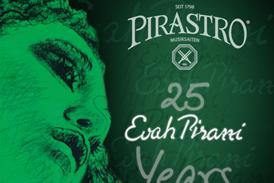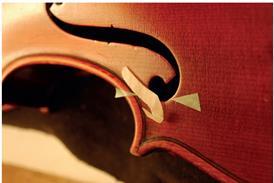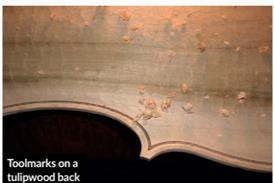- News
 Celebrating the 25th anniversary of Evah Pirazzi violin strings
Celebrating the 25th anniversary of Evah Pirazzi violin strings New York double bass dealership Kolstein Music sued by five different owners
New York double bass dealership Kolstein Music sued by five different owners Winners announced for the Wigmore Hall International String Quartet Competition
Winners announced for the Wigmore Hall International String Quartet Competition Motus Quartet wins 10th International Joseph Joachim Competition for chamber music
Motus Quartet wins 10th International Joseph Joachim Competition for chamber music
- For Subscribers
- Student Hub
- Playing Hub
- Podcast
- Lutherie
- Magazine
- Magazine archive
- Whether you're a player, maker, teacher or enthusiast, you'll find ideas and inspiration from leading artists, teachers and luthiers in our archive which features every issue published since January 2010 - available exclusively to subscribers. View the archive.
- Jobs
- Shop
- Directory
- Contact us
- Subscribe
- Competitions
- Reviews
- Debate
- Artists
- Accessories
Pietro Castrucci: Resurrecting a Baroque maverick

When Gerald Elias unearthed music by the little-known London-based 18th‑century composer and virtuoso violinist Pietro Castrucci, he discovered a unique and independent musical voice
How many recordings are there of the Brahms Violin Concerto? Dozens, at least. As a devoted Brahms lover, I humbly ask: does the world truly need another recording of the Brahms Violin Concerto? I ask those questions rhetorically as a lead-in to the next: how many recordings are there of the complete Sonate a violino e violone o cembalo op.1 by Pietro Castrucci? Answer: zero.
Under the auspices of Centaur Records, and in collaboration with my Salt Lake City colleagues harpsichordist Pamela Palmer Jones and cellist Noriko Kishi, that unfortunate omission has now been happily rectified. In my opinion it was long overdue; but in the interests of fair play, one might ask: does the world need even one recording of Castrucci’s op.1? I hope the reader will share my view that the answer is a resounding ‘yes’.
I had never heard of Pietro Castrucci (1679–1752) until a few years ago when I was researching new repertoire for the annual Vivaldi by Candlelight concert in Salt Lake City, Utah, of which I’ve been the music director since 2004. In 2017, I put together a diverse programme that included lesser-known Baroque composers. I called it A Kaleidoscope of the Baroque, and it was to feature music by two composers most people have heard of, Bach and Vivaldi, plus works by the lesser-known Biber and the even lesser-known luminaries Alessandro Stradella and Giuseppe Antonio Brescianello. As my exploration took me deeper and deeper into the vast recesses of the Baroque cavern, I was overjoyed to discover a set of a dozen dramatic concerti grossi by a composer I’d never heard of. It was Castrucci, and he seemed to have a uniquely independent voice that separated him from his contemporaries. I immediately added his Concerto Grosso in G minor from his op.3 to the programme.
Already subscribed? Please sign in
Subscribe to continue reading…
We’re delighted that you are enjoying our website. For a limited period, you can try an online subscription to The Strad completely free of charge.
* Issues and supplements are available as both print and digital editions. Online subscribers will only receive access to the digital versions.
























